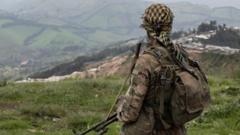Could DR Congo's Peace Process Be Failing With 140 Civilians Killed by Rebels?

In July 2023, the M23 rebel group reportedly killed at least 140 people in eastern Democratic Republic of Congo (DRC), marking one of the most severe atrocities attributed to the group since its resurgence in late 2021. This violence occurred despite ongoing peace efforts, including a ceasefire agreement brokered by the US and Qatar. Witnesses describe horrific scenes of mass executions, particularly involving women and children, as the conflict in this mineral-rich region escalates.
Last updated: 29 October 2023 (BST)
Key Takeaways
- M23 rebels allegedly killed over 140 people in July 2023.
- The violence occurred despite ongoing peace negotiations.
- Witnesses reported mass executions and brutal assaults on civilians.
- Rwanda has been accused of supporting M23 operations in the DRC.
- International bodies are urged to take action against the perpetrators.
Background of the Conflict
The M23, or March 23 Movement, is a rebel group primarily composed of fighters from the Tutsi ethnic group, which has been active in eastern DRC since its formation in 2012. The group emerged in response to conflicts and tensions arising from the 1994 Rwandan genocide, which saw mass killings of Tutsis by Hutu militias. This historical context is essential in understanding the ongoing volatility in the region.
Since late 2021, the M23 has gained significant ground in eastern DRC, capturing large portions of territory, including the strategic city of Goma. The resurgence of the group has led to increased violence, displacing hundreds of thousands of civilians and exacerbating an already dire humanitarian crisis.
The July Atrocities
According to a report from Human Rights Watch (HRW), the M23 rebels executed civilians between 10 and 30 July 2023 in the Rutshuru area, near the Virunga National Park. Witnesses described a coordinated assault where rebels surrounded villages, effectively cutting off all escape routes for local residents. The report details the use of machetes and gunfire against unarmed civilians, including women and children, many of whom belonged to the Hutu ethnic group.
One witness recounted the events of 11 July, stating that M23 fighters were already present in large numbers, ready to execute their gruesome plan. A woman shared a harrowing account of witnessing her husband being killed before her eyes. She managed to survive by falling into a river, escaping the gunfire that ensued.
Allegations of External Support
The report cited multiple sources, including medical personnel and military officials, suggesting that the Rwanda Defence Force (RDF) was backing M23 operations. These claims align with previous allegations that Rwanda has provided military support to the rebels, despite Kigali's vehement denials. The RDF has been accused of complicity in the killings, with the UN reporting that at least 319 people were killed in the same timeframe across four villages.
The Role of International Bodies
The ongoing violence has drawn the attention of various international organisations. HRW has urged the UN Security Council and the European Union to take a firm stance against the atrocities, recommending sanctions and the prosecution of those responsible for war crimes. These calls come amid stalled peace negotiations and heightened tensions in the region.
Current Peace Efforts
Despite attempts at brokering peace, including a ceasefire agreement between the M23 and the DRC government, the situation remains precarious. Recently, the M23 withdrew from peace talks, citing the Congolese government's failure to meet its commitments. This collapse in negotiations further complicates an already tense situation, with potential consequences for civilians caught in the crossfire.
The Humanitarian Impact
The conflict has had devastating effects on the civilian population. The UN estimates that thousands have been killed, and hundreds of thousands have been displaced due to ongoing violence. Many communities are suffering from severe food insecurity and lack of access to basic medical care as fighting continues.
Reports of M23 fighters demanding that families bury their loved ones immediately, or leave the bodies unburied, further illustrate the trauma inflicted on local communities. This practice not only robs families of their right to mourn but also prevents any proper investigation into the atrocities committed.
What Happens Next?
The situation in eastern DRC remains fluid, with various armed groups vying for control. As international calls for accountability grow louder, the question remains: will the global community be able to intervene effectively, or will the cycle of violence continue unabated? With peace negotiations faltering and violence escalating, the humanitarian crisis is likely to worsen unless decisive action is taken.
The unfolding events highlight the urgent need for a robust international response to ensure the protection of civilians and support for peace efforts in the region. As the world watches, the focus must remain on safeguarding human rights and ending the cycle of violence that has plagued eastern Congo for decades.
FAQs
What is the M23 rebel group?
The M23, or March 23 Movement, is a rebel group formed in 2012, primarily consisting of Tutsi fighters in eastern Democratic Republic of Congo. It emerged amidst ongoing conflicts stemming from the Rwandan genocide.
What were the recent atrocities committed by the M23?
In July 2023, the M23 rebels reportedly killed over 140 civilians in eastern DRC, with horrific accounts of mass executions, particularly targeting women and children.
What is the international response to the situation in DRC?
Human Rights Watch and other international bodies have urged the UN and EU to condemn the violence, impose sanctions on perpetrators, and support accountability measures for those involved in the conflict.
How has the conflict impacted local civilians?
The ongoing violence has led to thousands of deaths and displacements, with many communities facing severe humanitarian crises, including food insecurity and lack of medical care.
What are the current peace efforts in the DRC?
Peace negotiations, including a ceasefire agreement between the M23 and the DRC government, have stalled, with the M23 withdrawing from talks due to unmet commitments by the government.
#M23Rebels #DRCrisis #HumanRights
Published: 2025-08-20 10:27:05 | Category: world



